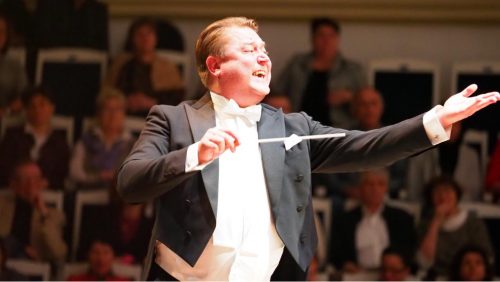 Russian Federation R. Strauss, Mahler: Tatarstan National Symphony Orchestra, Anastasia Kalagina (soprano) /Alexander Sladkovsky (conductor), Tchaikovsky Concert Hall, Moscow, 11.11.2019. (GT)
Russian Federation R. Strauss, Mahler: Tatarstan National Symphony Orchestra, Anastasia Kalagina (soprano) /Alexander Sladkovsky (conductor), Tchaikovsky Concert Hall, Moscow, 11.11.2019. (GT)

R. Strauss – Death and Transfiguration Op.24, Four Last Songs Op. posth.
Mahler – Symphony No.5
This concert opened the second subscription series presented by this outstanding orchestra from Kazan – a considerable honour and a sign of the regard with which these musicians are held by the capital’s concert-going public. This orchestra certainly has a ‘wow’ factor both in its standards of performance and its exciting repertoire wherever it travels. Alexander Sladkovsky already has his supporters and devotees in Moscow – a city that boasts some of the finest virtuoso orchestras in Russia.
This concert is remarkable in programming two late romantic composers, a trend which will be continued in their next Moscow concert which will feature Wagner’s Der fliegende Holländer. In a glowing performance of Death and Transfiguration, a magical moment developed with the high strings – playing as if awakening under gentle gasps of emotion – backed by fine playing from the woodwind. There was stunning virtuosity from the solo violin of Alina Yakonina. Sladkovsky showed impeccable control of the crescendos and diminuendos and wonderfully controlled the development to the final culmination – a wonderful opening for the evening’s music-making.
Anastasia Kalagina is a member of the Mariinsky Opera and is a prize-winner of several major song competitions both in Russia and internationally. Kalagina’s father was an assistant conductor with the Kazan ensemble and conducted at the Mariinsky Theatre for many years. In the Strauss songs, once again the orchestra revealed how accomplished they are in offering finely poised accompaniment; their gloriously velvety strings embellishing the singing with a refined, almost Viennese lustre. In the second Hesse setting; ‘September’, Kalagina was glorious in her articulation and empathy with the text. In ‘Beim Schlafengehen’, a beautiful violin solo sensitively assisted the soprano’s intimate tessitura, offering a magical interpretation. In the final ‘Im Abendrot’, following the stormy opening, there was some delightful flute playing, aptly supporting Kalagina’s beautiful intonation. It was after her marvellously judged ‘Ist dies etwas Tod?’ that this performance was brought to a touching close by the seven-note quotation from the composer’s Death and Transfiguration. Kalagina is a singer whom we will be hearing more of in the coming years.
The TNSO’s previous performances of Mahler’s Sixth and Eighth Symphonies here meant that this interpretation of Mahler’s Fifth Symphony was eagerly awaited by the Moscow public. It was with a barely perceptible downbeat that the conductor introduced the solo trumpet – superbly enacted by Denis Petrov and followed immediately by the immensely dramatic entry of the orchestra. There was a uniformity of sound across the whole ensemble, and after the secondary weeping theme, the ever so soft roll on the timpani introduced the return of the funeral march and there was dramatic attack by the strings – one of the most stunning moments in the great opening movement. The following Sturmisch bewegt produced some of the most exciting playing I have heard by this orchestra. Here there was great virtuosity, a unity of ideas and great drama, matched with excitement from the TNSO. Remarkably Sladkovsky has an acute feeling for the Mahlerian phrasing and translucent orchestral textures permitting greater depth to the playing. In the Scherzo, there was some scintillatingly beautiful cello playing, followed by magically eloquent clarinet from Artur Muchamedzhin – again almost perfection – with the scintillating charming waltzes and Ländler in true Viennese style. Certainly, Sladkovsky has the sense for Mahler performance – a complete understanding of the structure, bringing out all the beauty of the music but also showing the depth of the tragedy.
The beauty of the strings and the harp in the Adagietto brought a fragile, intimate intensity avoiding the sentimentality of other performances. Everything was as near perfect as one could imagine with the timing for this masterly piece coming in at ten minutes. In the Rondo finale, it was clear that we were hearing a world-class orchestra with a conductor of the highest standards: there was impassioned playing that had an amazing degree of unity and one voice. The build up to the final climax was earth shattering in its drama and excitement.
Gregor Tassie

No comment on horn solos in the Scherzo?
Yes, you right, the horn solos were magical, but if I mentioned everything in this performance, it would have made a very long read. Russian orchestras do not always play western repertoire well in the brass sections, but here Sladkovsky has trained the brass marvellously well without the errors in phrasing which occurs in other Russian orchestras.